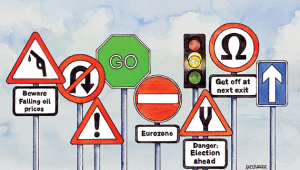 MIPIM is associated with big numbers: 21,000 participants including 3,000 chief executives and chairman, 93 countries represented, 2,225 exhibiting companies and 430 journalists. It is also intrinsically international, a time when everybody lifts their heads and gazes to distant horizons.
MIPIM is associated with big numbers: 21,000 participants including 3,000 chief executives and chairman, 93 countries represented, 2,225 exhibiting companies and 430 journalists. It is also intrinsically international, a time when everybody lifts their heads and gazes to distant horizons.
So it is worth me doing the same. Is this a time to be a little bit optimistic?
A few weeks before Christmas, David Cameron talked of “red warning lights” on the dashboard of the global economy. The prime minister’s message appeared to be that people and businesses should batten down the hatches: the government would do its best to keep the economy on an even keel but these were going to be pretty rough international waters.
At the time I thought the warning was rather overstated, though I could see why he was doing it. Cameron was getting his excuses in early, in case the UK slowed down in the run-up to the election. And if it did not, then this would show even more convincingly that the economy was safe in his and George Osborne’s hands.
Some people did take the warning seriously, citing a series of factors about which we should be worried. Most lists included the threat of eurozone break-up triggered by the Greek general election, the spread of the Ebola crisis, Russia’s aggression against Ukraine, and the growing terrorist threat – most notably from Islamic State.
There are always things to worry about. In some respects, however, there is less to worry about than there was. The Greek election saw the radical left-wing party, Syriza, come to power, with Alexei Tsipras as prime minister. He is the 186th Greek leader in less than 200 years. Whether he lasts longer than most of his predecessors remains to be seen, but for a time his new government appeared to be on a collision course with Germany that could have seen Greece on its way out of the euro.
That could still happen, but Greece has won a four-month period of grace. The main message from the negotiations so far is that Greece does not want to leave the euro, and the rest of Europe, while insisting that Greece sticks broadly to its deficit-reduction plan, does not want it to leave either. Meanwhile, and perhaps surprisingly, the European economy has strengthened.
Europe is not the only area where things have turned out better than feared. The Ebola crisis has not gone away but there are reasons for optimism, notably in Liberia, with the hope that the outbreak can be contained elsewhere.
It is not all better. The Russia-Ukraine crisis is still of concern, despite a negotiated ceasefire. Russia remains unpredictable. The terrorist threat has not gone away.
But – as discussed here last month – it has not prevented a growth-boosting fall in world oil prices. So there are some good signs, along with evidence of growth and job creation in the US. That could persuade the Federal Reserve to begin hiking interest rates in the summer. Slower growth in China is balanced by stronger growth in India.
Some of those red warning lights have not disappeared. But others have turned amber.
David Smith is economics editor of the Sunday Times











